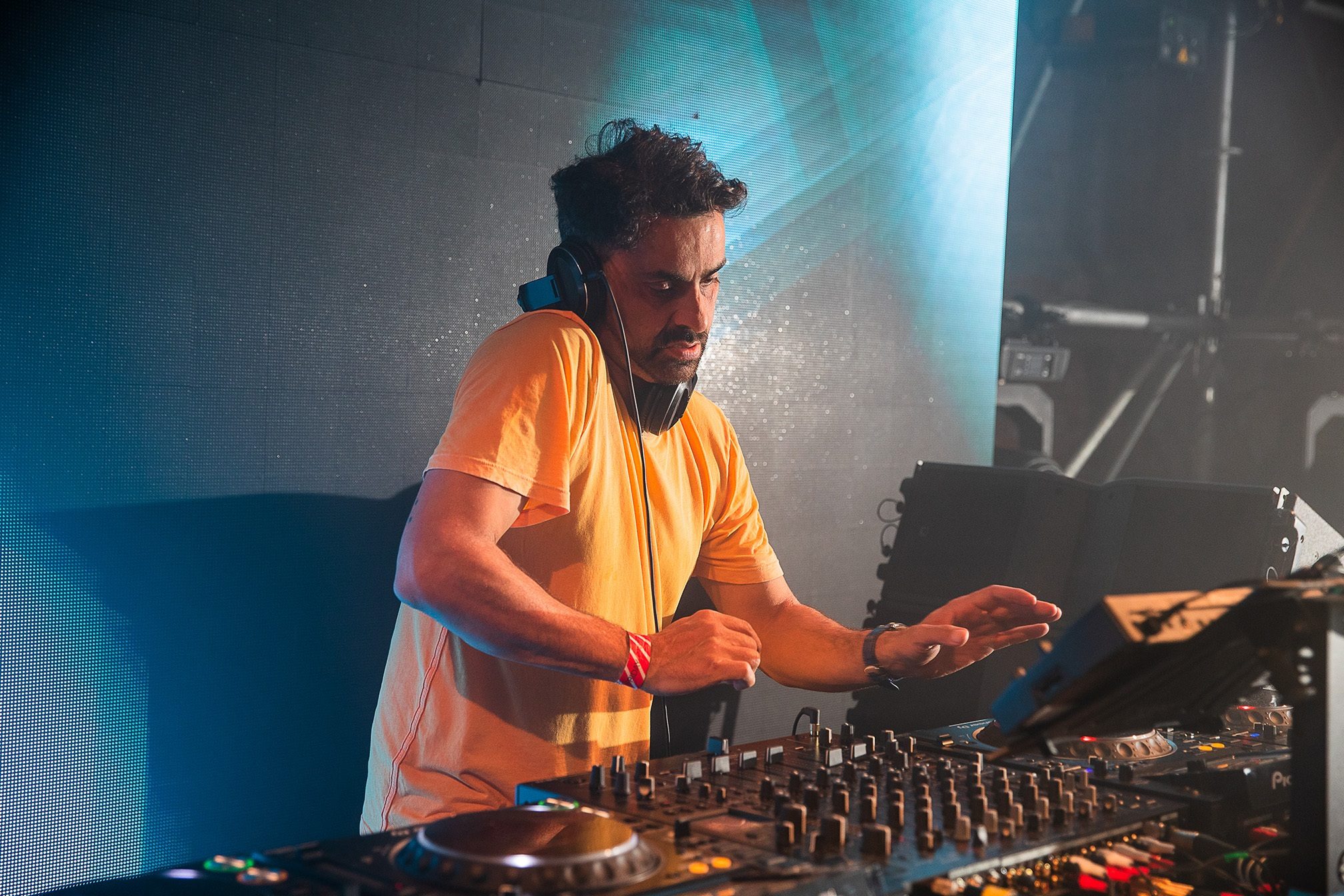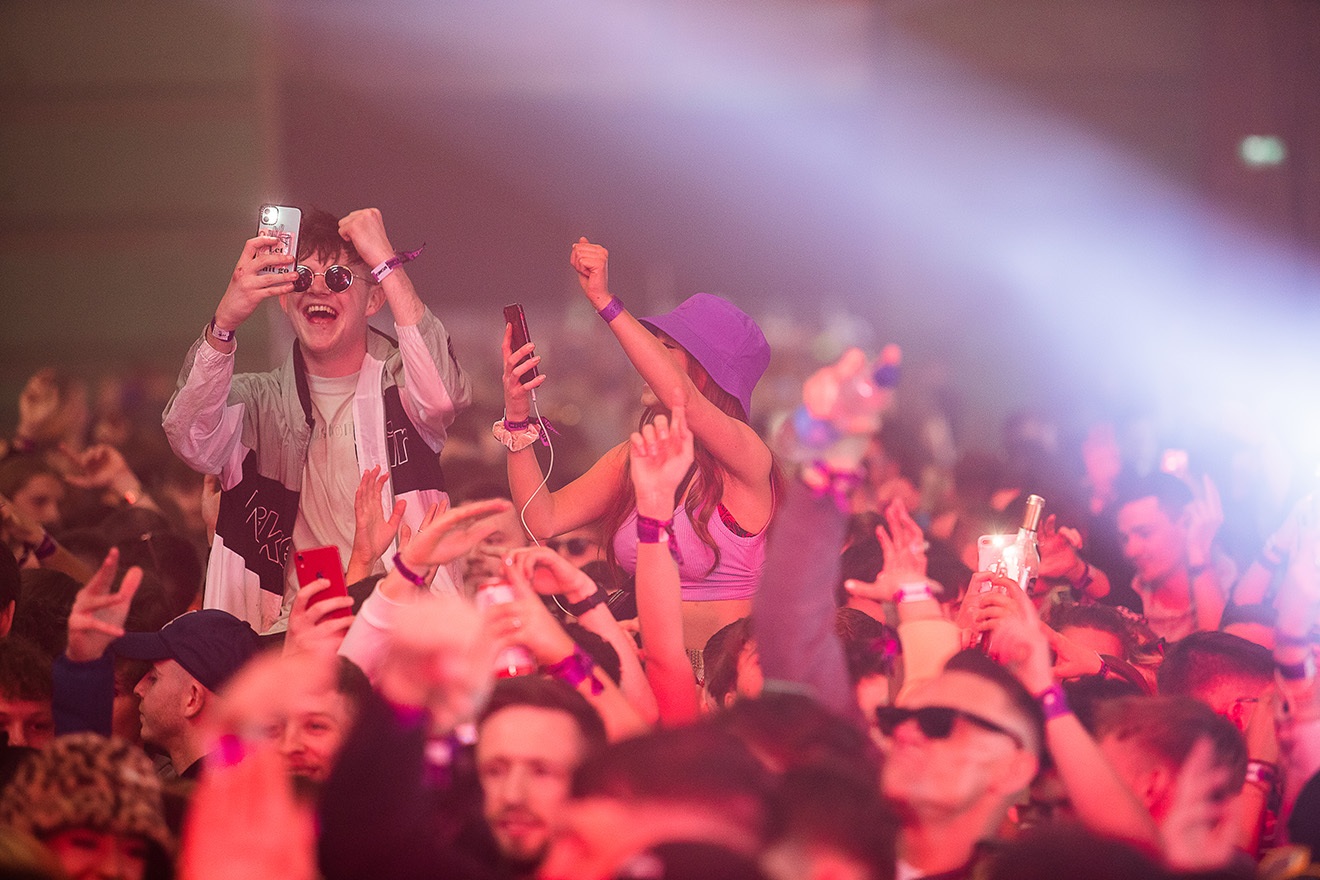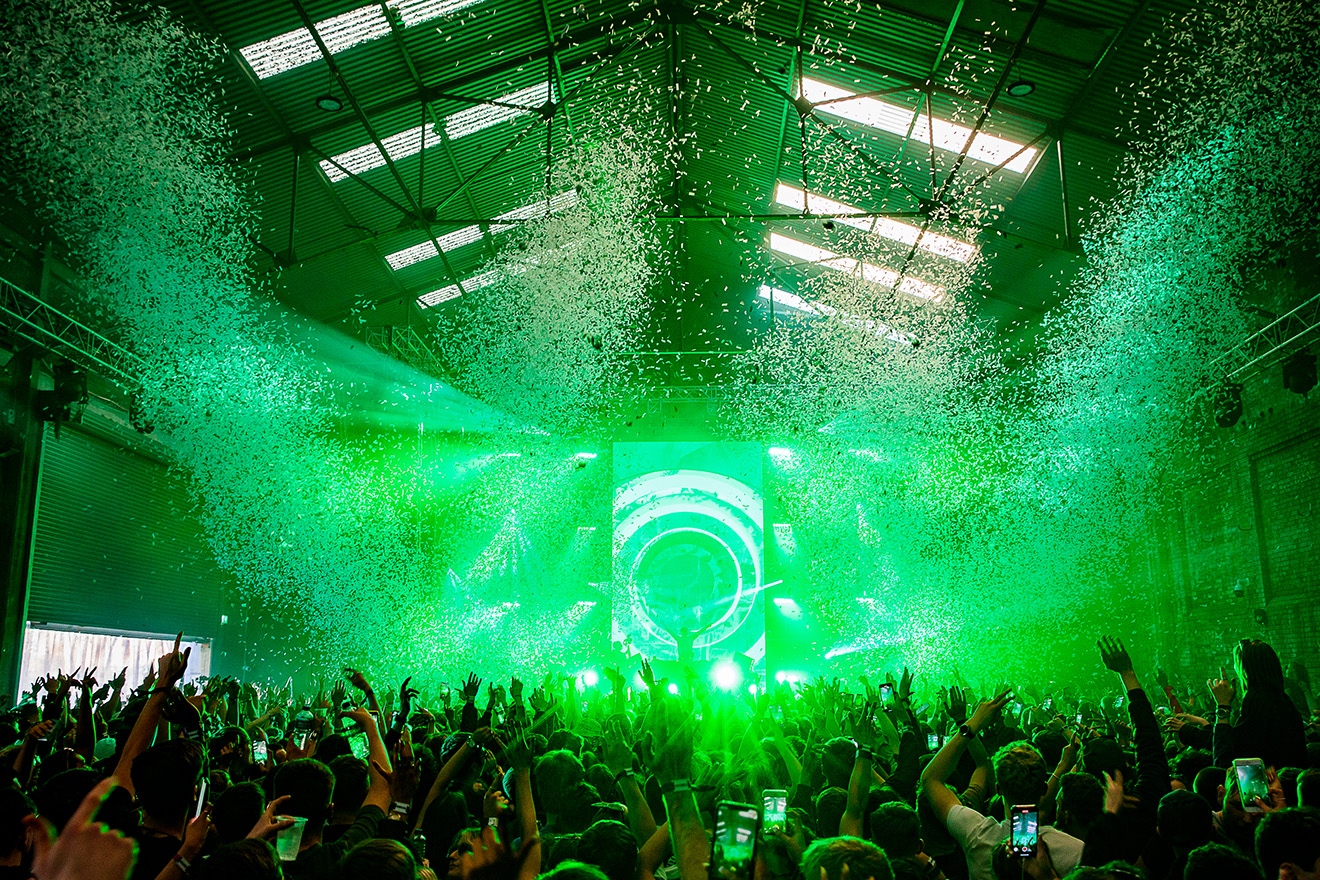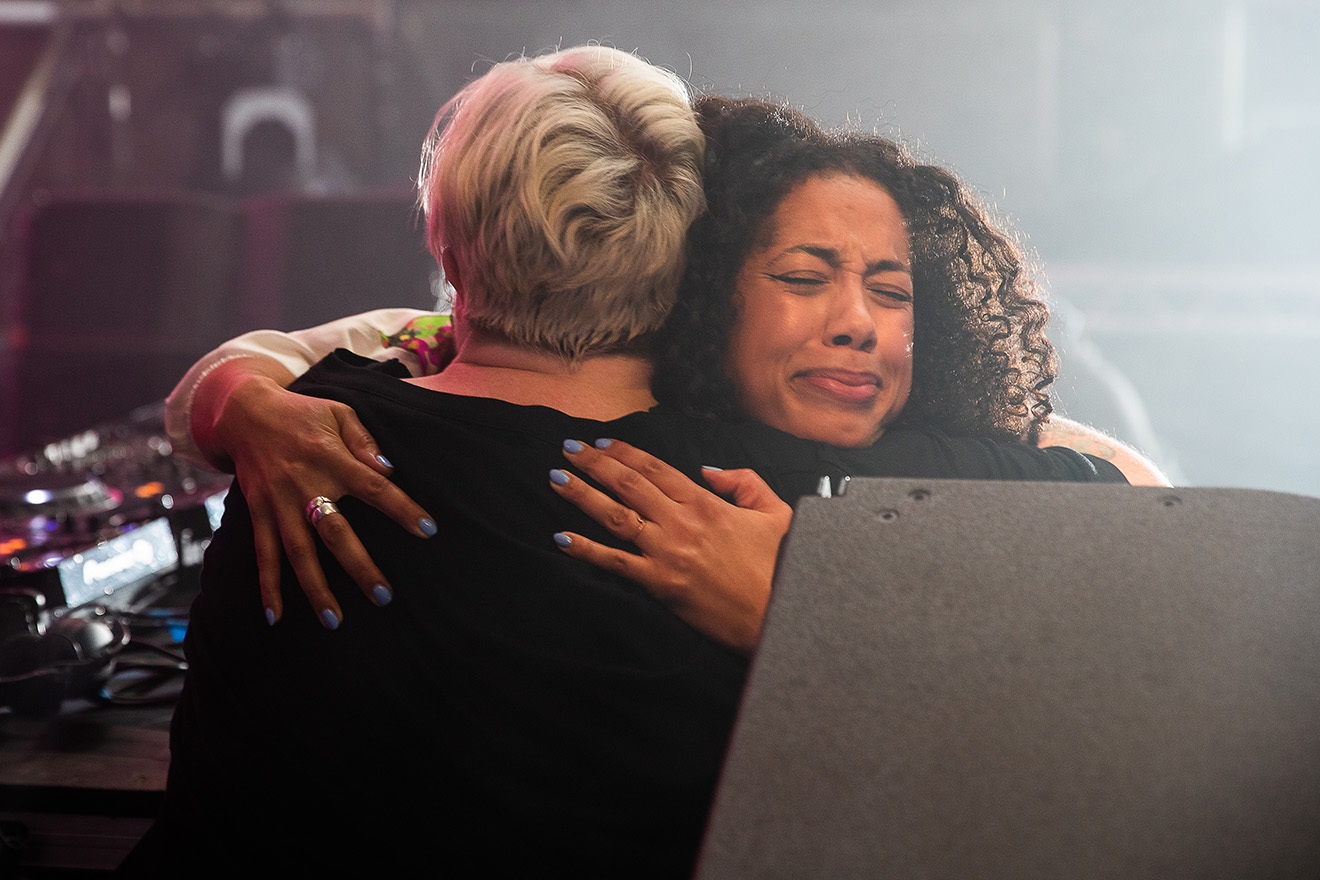 Features
Features
Listen to Yousef's life-affirming mix from The First Dance
Paddy Edrich speaks to Yousef about the joys and pressures of hosting the UK's first unrestricted club night since the pandemic began
Over two sunny days at the beginning of the early May bank holiday, Bramley Moore Dock on the banks of the river Mersey played host to the first unrestricted UK club nights since the pandemic began, as pilots in the Government’s Events Research Programme testing the safety of allowing events to reopen.
6,000 eager ravers attended two days organised by the iconic, Liverpool-based CIRCUS brand, who for nearly 20 years has been a beacon for house and techno events across the North West.
Read this next: Review: The UK's first club night back was an ecstatic reminder of pre-pandemic life
Performing across the two days were a myriad of electronic music talent, including Jayda G, Fatboy Slim, The Blessed Madonna, Jaguar and CIRCUS founder Yousef.
Emotions were running high from performers and fans alike, as every song played reminded attendees what has been torn away from them for so long, while the opportunity to share in a truly unique atmosphere surrounded by like-minded individuals showed that nature may in fact be healing.

When we spoke with Yousef just before the events, he spoke about the significance of putting on a show where people could intimately enjoy the day and feel connected with each other, bringing back a return to the original rave ethos that has been lost since the pandemic first arose. “This is a moment where every record that I play, it’s gotta be emotionally charged or high energy, and it’s going to make people feel amazing,” he said.
The two day showdown was a resounding success, giving its attendees a small window of normality away from the COVID restrictions that were firmly in place outside the warehouse’s front doors. Attendees did not have to wear masks or socially distance once inside; all that was required for them to gain access into the first legal event in nearly 14 months was produce a negative PCR test result.
Read this next: Results from COVID pilot events show 'no impact' on virus spread
Data recovered from the event, as well as from the other government-backed initiatives across the country, found that non-masked events were no more dangerous than going shopping or to a restaurant. This gives hope to many within the music industry that the return to full, unrestricted events on June 21 is a realistic target. However, the recent discoveries of new variants in the UK may yet delay this date. The Government is yet to confirm whether the return to normality will in fact go ahead on the proposed date.
With a track called ‘Float Away’ on FFRR Records (with an accompanying video featuring footage from the pilot event) set for release at the end of June and a full summer schedule with CIRCUS, Yousef is hopeful that the pilot scheme was the kickstart that can spur on the return of the night-time industry.
Yousef recorded his life-affirming set at The First Dance, which you can listen to below. We also caught up with him to hear more about the event itself, and what the foreseeable future of club culture may look like.
Last time we spoke to you, you were just coming to the end of all the hours of preparation for the events. Put into words for us the moment when you saw the doors open and the warehouse began to fill with people for the first time...
I actually played two sets on the first day so I was playing the very first record in the first hour. I played a record I made called ‘Welcome to the World’. What I saw were people screaming on the dancefloor, literally running forward and shouting “Thank you!”. Some were even down on their knees, praising. It was emotional from that second on. Some lovely girl was trying to get my attention and gave me a card with a message inside saying how much she had been looking forward to this, and thanking me for the effort. This was while I was trying to remember how to DJ as I hadn’t done it for 14 months. I was just trying to take it all in while trying not to burst into tears at the same time!
This was the first insight back into clubbing here in the UK. Did you feel the pressure to put on a show that could prove to the government that clubbing was ready to return?
The pressure was absolutely ludicrous. We’d been knocking on the door of the council for some time, but we only got the call up with three-and-a-half weeks' notice to put on the event. Thinking about it now, it was all so risky. The amount of work that went into it was huge. Firstly we had to organise the infrastructure of the venue, which is basically a warehouse with no water and no electricity. We had to build all the stage and crowd barriers. Then we had to sort the line-up, sell the tickets, deal with the audience and then the science and testing protocols before the avalanche of media and COVID deniers. It felt unpleasant at times but in the end we got 7.5 billion engagements on the event. Even though it wasn’t always pleasant, it was overwhelmingly positive. There was so much pressure on the day, but it was offset by knowing we had an amazing team. We had literally the best in the business in their roles, and everyone was on their A game.
Read this next: Barcelona venues pilot “100% COVID-free system” for indoor nightlife
In the days following the event, there was criticism surrounding the appearance of some artists, particularly Sven Väth after he toured India before the COVID surge there. How did you decide what artists to book for the event?
Firstly, they were all UK residents. Secondly we wanted a range of people who represent the full footprint of electronic music in 2021, and come from a range of walks of life. We obviously wanted some big headline names, so for example, Fatboy Slim asked us if he could play. It was just a range of faces that have represented CIRCUS over the years and will represent us going forward as well.
You previously described the event as an oasis of normality away from everything else that was going on. Was it surreal leaving the event and returning back to the enforced restrictions?
I think getting into the restrictions of day-to-day life were the least of our worries. Getting back into real life after all the focus and the energy that we had put in was much more of a challenge. The energy output everyone put in was absolutely phenomenal; I think it took me about two weeks just to release that buzz.
What were the emotional reactions of all the artists when they took to the stage?
Every single artist involved was in complete awe of the situation. Everyone really got the significance of what was happening in terms of the future of the UK. Most people involved were highly experienced, high profile DJs, but were all super grateful. Everyone was contributing to the moment, both with their skills as a DJ but with their personality as well. I think it was pretty overwhelming for everyone.

In your second set, you opened with Ultra Naté’s ‘Free’. That must be a moment that will stay with you forever...
I was sitting on the couch the day before planning that moment as I knew we needed to do something like that. The whole set up started with a track that I released at Christmas with Rowetta called ‘When We Were Free’. It really symbolised everything that was going on with COVID, and we donated any money from it to charity to support in-need families. I had the breakdown of my track and then a clip of Martin Luther King saying “free at last”, before stopping the track to hear the crowd noise and then I started ‘Free’. From the first guitar lick the room became electrified and there wasn’t a dry eye anywhere. It was more Hollywood script than you can ever imagine. Everyone has had a difficult time over the past fourteen months, so it was a deeply significant moment.
There was a brilliant photo posted after of the whole team involved in the event. It really shows how music doesn’t just benefit us culturally, but so many people’s livelihoods depend on it...
Sam Newson, the event producer, said to me a couple of days before that we should get a team photo, so we all made sure not to be late on that first day. There were 150 people involved, and that was just our side, not including local authorities and scientists. It was an enormous team effort to get this over the line and the professionalism of everyone involved was incredible.
I’ve got a simultaneous project that I’ve been running for the past five months, trying to get the electronic music industry recognised as an art form within the government. It’s something that’s nearly ready to be launched. That photo you mentioned can be used to show how many incredibly skilled professionals there are, who just aren’t understood. This event had seven to eight billion engagements, it’s clearly got an enormous footprint on the world, but the government doesn't get it.
Read this next: Six DJs respond to the government telling them to get new jobs
It’s also a collaborative process, so in all the interviews I’ve done, I have always made sure the ravers get a mention as well. They’ve contributed their own time and effort to making this all go ahead. They were coming for a day out, but many took time off work, they had to pay for entry and get tested and all that. They are very much a part of the community.
You and your team’s work didn’t finish after the events. What were your next steps in the following days?
At first our focus was dismantling the whole production setup, but after that it was all about hearing feedback and encouraging people who came to take their tests. This was to make sure we got the data to pass onto the scientists. The scientists were absolutely brilliant, so shout out to Iain Buchan and his team. Even though everyone working on the project were from different walks of life, we all came together as a collective.
Read this next: Government trials indicate mass events are no more risky than 'going shopping'
What did the data you got back show? Was there anything in the data that showed that we can’t move ahead with the return to clubs on June 21?
The data was successful. Out of the 6,000 people coming into the event, only one or two tested positive. After the events, it was so minimal, I don’t even know if we had any. There may have been a handful in the 16,000 people who attended events across the country at Sefton Park and the snooker. Even then, it’s difficult to figure out if it was precisely from the events. Everything was carried out very, very successfully.
The really difficult part is the COVID situation seems to be changing on a day-to-day basis. Hopefully the work we did on April 30 and May 1 will get us to June 21, but it seems that everything might have shifted in the past few days. I really don’t know, but whatever happens, the first time was incredible.

What do you see for the future of clubbing in the UK moving forward? Do you think we’ll see things like pre-event testing for the foreseeable?
I honestly don’t know, I hope not. If it does come in, it’ll be a short term necessity. If it does remain, hopefully it will still be free for people but that can’t be permanent. Obviously we just want to go out there and party. I would worry about the levels of intrusion if it carried on for a long time, but I am desperate for events to return. I don’t want testing, but I certainly don’t want to carry on not earning income, just like thousands and thousands of other people in the same position. It’s an awful catch-22 to be in.
We’ve seen a lot of festivals postponed once again because of a lack of government-backed insurance. Do you feel this is a failing on the Government’s behalf, especially after the data from the pilot events was so positive?
In one word, yes. I really can’t see the logic, especially when they are guaranteeing events in other areas. Maybe it falls back into what I was saying earlier, that they genuinely don’t understand the economic footprint and cultural significance of electronic music. Hopefully we’ll be able to start to change their perceptions in the next few months. In terms of insurance, I think that should be organised immediately. It’s really frustrating that it hasn’t been, but again, it is up to the powers that be. I know that Michael Kill at the NTIA [Night Time Industries Association] has been banging down the door, trying to get support for the electronic music industry. If he can’t get a straight answer, I don’t think anyone can.
Read this next: Roaring 20s: Why club culture could surge this decade
What events does CIRCUS have planned for the rest of the year?
We’ve got a series of major events booked all summer long. We’ve got a Sasha show that’s sold out, I’m playing for five hours for NHS charities which is sold out, and we have two elrow shows that are almost sold out as well. We then have two CIRCUS main shows that will be unbelievably high profile. We’ve got all sorts throughout the rest of the year, hopefully at Bramley Moore Dock where we did the pilot events. We hope to be able to keep the keys after for a bit longer as Everton FC’s new stadium will be built there. We’re just hoping we can get back to it all and start to claw back the fourteen months that we lost.
Paddy Edrich is a freelance writer, follow him on Twitter
Tracklist:



